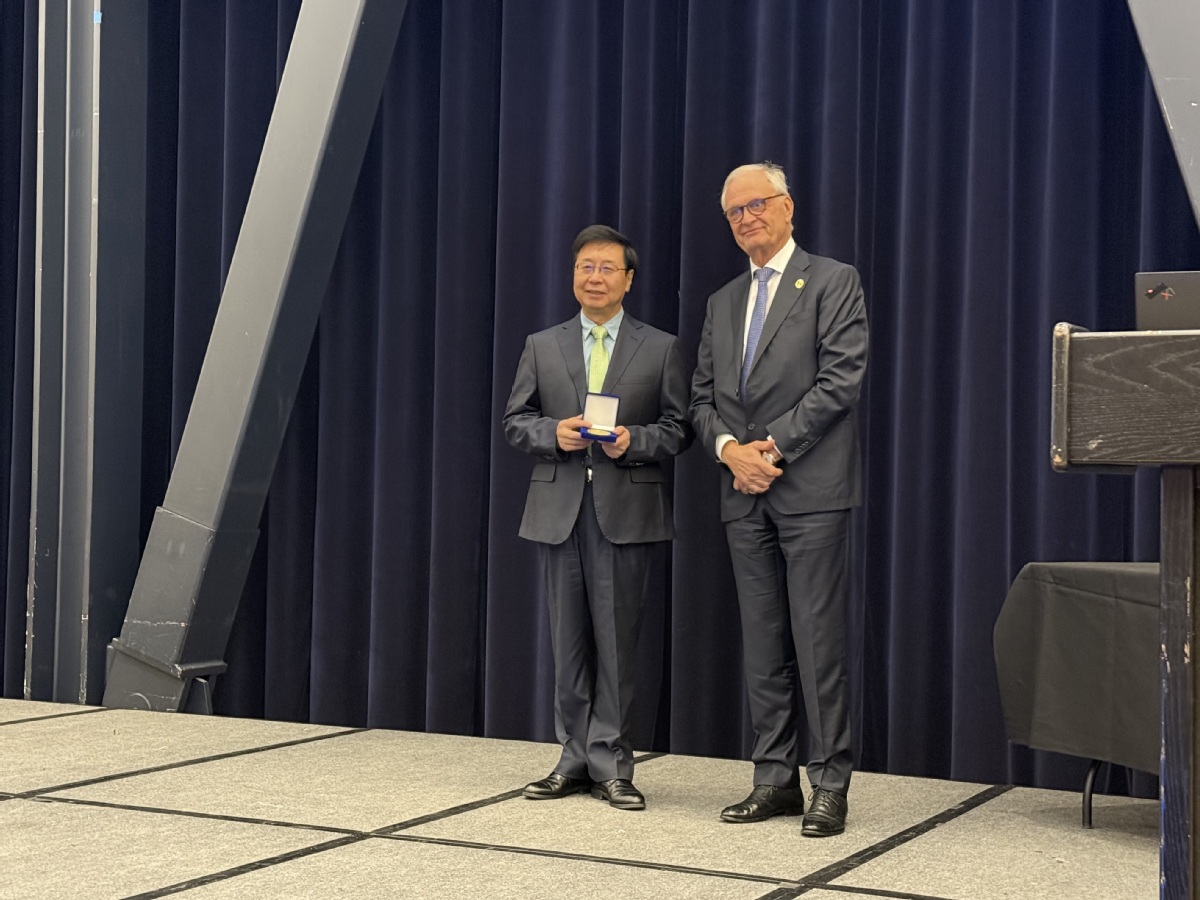

Qu Jiuhui (left), a scientist at the Research Center for Eco-Environmental Sciences of the Chinese Academy of Sciences and an academician at the Chinese Academy of Engineering receives the 2024 Nobel Sustainability Award for "Outstanding Research and Development in the Field of Water" from Peter Nobel, a member of the Nobel family and chairman of the Nobel Sustainability Trust, at the awards ceremony on Wednesday at the University of California, Berkeley. [LIA ZHU / CHINA DAILY]
As the world grapples with an escalating water crisis, a Chinese scientist's innovative solution to water pollution is receiving international acclaim for its potential to benefit more people worldwide, particularly in developing nations.
Qu Jiuhui, a scientist at the Research Center for Eco-Environmental Sciences of the Chinese Academy of Sciences and an academician at the Chinese Academy of Engineering, has been awarded the 2024 Nobel Sustainability Award for "Outstanding Research and Development in the Field of Water".
"Today, we are facing a serious water crisis, because this marvelous and pure substance has been polluted and overexploited by humans. Deeply rethinking what we have done wrong is urgently needed, as well as correcting the mistakes and making the polluted water clean again," Qu said at the awards ceremony Wednesday at the University of California, Berkeley.
The Nobel Sustainability Trust praised Qu's development of a "from source to tap" technical system that ensures safe drinking water across urban and rural areas. His innovations include breakthrough low-cost technologies for removing arsenic and fluoride from groundwater, with the potential to positively affect more than 200 million people globally.
For more than two decades, Qu has led China's Water Science and Technology Innovation Plans, making significant contributions to ecological and environmental restoration projects, including Yangtze River protection and the Baiyangdian wetland remediation, according to the Nobel foundation's news release.
His achievements also include developing large-scale infrastructure projects with industry partners and leading the development of China's first wastewater-resource factory in Yixing, Jiangsu province.
In his laudation for Qu at the ceremony, Slawomir Hermanowicz, a professor at UC Berkeley's Department of Civil and Environmental Engineering, lauded Qu's work as "a shining example of the transformative power of science innovation".
Hermanowicz particularly emphasized the significance of Qu's active zone-purification technology, which has been "instrumental" in major water-source restoration projects throughout China.
"While we are disinfecting water to get rid of pathogens, we are introducing other carcinogenic materials. So, his contribution was to reduce this problem at over 20 large-scale water treatment plants," Hermanowicz explained.
The impact of Qu's work extends beyond technical innovations. His leadership in fostering public-private partnerships has been crucial in translating scientific research into practical applications, ensuring that cutting-edge technologies benefit both urban and rural populations, said Hermanowicz.
"As an adviser to the United Nations Environmental Program (UNEP), Qu has actively promoted international collaboration, sharing water-treatment technologies with developing nations such as Sri Lanka and Nepal," he continued.
"Driven by the combined challenges of population, pollution and climate change, the world is facing a serious water crisis now — water pollution, water shortage and hydrological hazards," Qu told China Daily. "The situation is particularly dire in poverty-stricken areas where access to clean water remains a significant challenge."
Over the past two decades, his team has developed user-friendly, cost-effective and low-maintenance water-treatment technologies specifically designed for rural areas. Those technologies have been used in villages in Sri Lanka, Nepal and Bangladesh.
"International collaboration is very important. We can share knowledge and best practices with each other and push the deployment of the technologies to benefit more people," Qu noted. His team has signed a memorandum of understanding with UNEP to facilitate technology transfer to other countries through the platform.
"I think this is the core of the Nobel Sustainability Awards that science and technology should benefit everyone everywhere," he said. (China Daily)

86-10-68597521 (day)
86-10-68597289 (night)

52 Sanlihe Rd., Xicheng District,
Beijing, China (100864)

